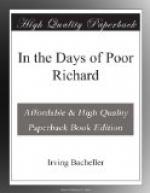The young man’s work had set the bells ringing and they were the bells of revolt. The arrival of General Gage at Boston in May, to be civil governor and commander-in-chief for the continent, and the blockade of the port twenty days later, compelling its population who had been fed by the sea to starve or subsist on the bounty of others, drove the most conservative citizens into the open. Parties went out Tory hunting. Every suspected man was compelled to declare himself and if incorrigible, was sent away. Town meetings were held even under the eyes of the King’s soldiers and no tribunal was allowed to sit in any court-house. At Salem, a meeting was held behind locked doors with the Governor and his Secretary shouting a proclamation through its keyhole, declaring it to be dissolved. The meeting proceeded to its end, and when the citizens filed out, they had invited the thirteen colonies to a General Congress in Philadelphia.
It was Solomon Binkus who conveyed the invitation to Pennsylvania and Virginia. He had gone on a second mission to Springfield and Boston and had been in the meeting at Salem with General Ward. Another man carried that historic call to the colonies farther south. In five weeks, delegates were chosen, and early in August, they were traveling on many different roads toward the Quaker City. Crowds gathered in every town and village they passed. Solomon, who rode with the Virginia delegation, told Jack that he hadn’t heard so much noise since the Injun war.
“They was poundin’ the bells, an shootin’ cannons everywhere,” he declared. “Men, women and childern crowded ‘round us an’ split their lungs yellin’. They’s a streak o’ sore throats all the way from Alexandry to here.”
Solomon and his young friend met John Adams on the street. The distinguished Massachusetts lawyer said to Jack when the greetings were over:
“Young man, your pen has been not writing, but making history.”
“Does it mean war?” Jack queried.
Mr. Adams wiped his brow with his handkerchief and said; “People in our circumstances have seldom grown old or died in their beds.”
“We ought to be getting ready,” said Jack.
“And we are doing little but eat and drink and shout and bluster,” Mr. Adams answered. “We are being entertained here with meats and curds and custards and jellies and tarts and floating islands and Madeira wine. It is for you to induce the people of Philadelphia to begin to save. We need to learn Franklin’s philosophy of thrift.”
Colonel Washington was a member of the Virginia delegation. Jack wrote that he was in uniform, blue coat and red waistcoat and breeches; that he was a big man standing very erect and about six feet, two inches in height; that his eyes were blue, his complexion light and rather florid, his face slightly pock-marked, his brown hair tinged with gray; that he had the largest hands, save those of Solomon Binkus, that he had ever seen. His letter contains these informing words:




